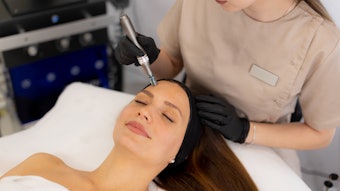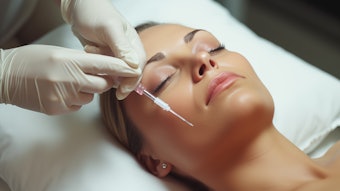
Medical spa owners, operators and managers believe in investing in health, or else they wouldn't be in the spa business. But with all this healthy concern, who is looking after the financial health of your medical spa? One of the most likely answers is a savvy insurance representative. A major key to your medical spa’s financial strength and solvency is having a knowledgeable insurance advisor to provide you with needed financial protection from accidents and forces of nature, and heightening this need is the fact that the insurance coverage needs of medical spas are quite unique.
Many—if not most—medical spas have a medical director who may be at least a partial owner. Some people think medical directors can simply bring their own insurance or malpractice coverage in to cover the medical spa, but sadly, this may not always be the case. The reason is a medical malpractice policy may cover the medical director, but most policies will exclude coverage for so-called “aesthetic services,” and such services are often at the forefront of medical spa offerings and operations.
So where do you go from here? Getting the right coverage and even the right insurance representative can be tricky, but here are 12 questions and answers that will guide you in making a wise selection.
1. Do I have comprehensive financial protection?
A good insurance professional for your spa is one who can procure insurance coverage to protect:
- the spa itself
- spa employees
- independent contractors
- medical directors
- any treating physicians
Again, do not assume a medical director’s medical malpractice policy will provide adequate coverage for a spa. Typically, medical malpractice policies will not extend coverage to a medical spa, leaving your business unprotected. So obviously, not having the right insurance representative can financially hurt a spa, and one of the chief risks is this kind of an insurance coverage gap.
2. Do I need an insurance broker or an insurance agent?
Be aware of the difference: Brokers represent insurance buyers—in this case, medical spas. Agents represent insurance sellers—usually insurance companies. Agents can be captives of a particular insurance company, and therefore may not be scouring the entire marketplace to get competitive quotes on coverage.
By contrast, an insurance broker can take a coverage need out to a broad network of providers in order to get competing prices. Brokers can tap several markets, whereas agents may tend to push just one insurance option or a more limited number of options.
Please note, in this discussion, the terms agent and broker may be used interchangeably, but it is still vitally important to understand the difference between them.
3. What is the profile of an ideal insurance broker?
Spa professionals should have a good idea of what to expect from an ideal insurance broker. Two key qualities include:
- Someone familiar with spas, who has handled the insurance needs of several of them. The broker also needs to have an insurance brokerage license in the state to conduct business there.
- The ability to provide your spa with more than just the professional liability coverage. Other options can includes workers’ compensation, a business owner’s package, employment practices liability and more.
4. How can I tell if my agent is doing a good job?
According to Arran Auld, an account executive with Valcourt Insurance Services in Orange, California, one yardstick to measure the effectiveness of an agent by is the time it takes them to respond to requests and queries.
One complaint customers have is it often takes too long to get something added to a policy. “Even if delays are on the insurers’ part,” Auld notes, “a good agent will keep the spa informed of what is or is not happening regarding placement of coverage, prices or claim status.”
A good agent should report back to you no matter what, saying things like, “We’ve received your request, and we are following up to …” Correspondence and communication is key.
Another way to judge whether insurance reps are doing a good job is to note if they offer several quotes or just give one renewal proposal from the incumbent insurer. Does the agent offer details on other insurances in the marketplace? The insurance market is currently soft—meaning it is characterized by available coverage, price competition and relatively broad coverage forms—so it should not be a huge challenge to obtain multiple quotes from various insurers. Hard markets are characterized by a relative unavailability of coverage, high prices and restrictive coverage terms.
5. What kind of information will my insurance representative want?
To determine a medical spa’s coverage needs and insurance costs, brokers and insurers will likely want to know the number of procedures done annually at the spa, its annual revenue and the credentials of those performing the procedures. Be prepared to address these types of questions.
6. Where does a spa professional go to locate a good insurance representative?
Information on quality insurance representatives can be obtained through directories, such as Skin Inc. magazine’s Buyer’s Guide, which can be browsed online.
Auld also suggests networking with other spa owners and managers to yield useful results. Tap into professional associations for recommendations, and network at trade shows and meetings. Use referrals. Seek names of references in the medical spa field, and check them out. Word-of-mouth referrals can validate whether or not a candidate broker is a genuine player in the field of procuring coverage for medical spas.
7. Should I use one insurance representative or two?
Another decision point is if your spa should use more than one insurance representative. Many believe it’s best if a spa has just one insurance rep, so long as that representative can cover all necessary aspects of the business. When spas use more than one broker or agent, though, insurance underwriters may have already quoted on the same account for a different representative. In that case, insurers may not work very hard to get your business.
8. How often should spas give their insurance rep a fresh look?
Reflect on this every year at your renewal time. An insurance broker or agent should demonstrate and verbalize annually that it wants your repeat business and not just lavish attention when you are a prospect. One question to ponder is, “Does my insurance rep fight for my business every year, or do they act complacent?”
Also, are you having breakdowns in service, turnaround or communication? If so, its likely time to start investigating new representatives in order to make a change.
9. If my insurance costs rise, is that a sign of my agent slipping?
Beware of blaming your insurance representative if the price of your coverage has jumped. Price hikes often have nothing to do with factors the insurance rep can control.
For example, if the spa’s revenues are higher than expected, that can lead to a push up of the premium. If revenues double or your clientele triples, insurance rates will rise.
Maybe the spa added new procedures, or there has been an indundation of recent claims filed. These factors can impact insurance rates as well, and the insurance intermediary controls none of this. Some spa professionals may hear of counterparts who pay less money for insurance, but the discrepancy may not just be in the price. The difference may lie in the credentials of the staff physicians, riskier procedures, the number of procedures, a business being new to the insurance market and a variety of other factors.
10. Should I always use the insurance rep who lines up our medical malpractice coverage?
A common mistake in picking an insurance representative is automatically selecting the same person who procures your medical spa’s medical malpractice coverage. Such people may know little about the insurance needs of medical spas, and furthermore, they may not get you the best price or will only go to one market.
Not all brokers or agents are well-versed in medical malpractice or medical spas, so networking is the best way to find out who is writing the best coverage for you.
11.How much should property coverage enter into my selection decision?
Good insurance reps will not only line up protection for client accidents and employee injuries, but also will make sure your spa is fully protected for property coverage.
For example, during a new spa’s build-out phase, the facility should have appropriate property coverage. Insurance such as builders risk coverage protects spas during the time of construction to completion, covering for thefts from the site.
Next, as soon as the lasers your spa has ordered get delivered, you need to have the property coverage in place—even if you have not yet started using or installing the equipment. Lease agreements often require that as soon as that equipment is delivered, the spa must have insurance coverage in place. Leasing companies often call demanding certificates of insurance, a document issued by an insurance company certifying that an insurance policy has been purchased. And to learn more about the terms of the trade, check out Insurance Terms for Medical Spas.
12. What non-price factors should you weigh in selecting an insurance representative?
Once you find a broker or agent who understands the unique insurance needs of your spa, go with someone you’re comfortable with. You need to feel the chemistry, knowing you are dealing with someone who knows what they’re talking about. Go with someone who understands the market and can offer all the coverages that you need. Get someone who is responsive and has a can-do attitude.
Also, inquire about ancillary services. Some insurance reps may know of consultants or lawyers who can address the unique legal or other needs of your medical spa. Others may be able to help you set up a risk management program. Others still can steer your spa to specialized insurers who can provide loss control assistance.
Insuring your peace of mind
By now, it should be clear that keeping your spa financially healthy is a team effort. Insurance can be the financial lifeline to a spa’s existence and solvency in the event of a lawsuit or a calamitous force of nature, and picking the right insurance representative builds strength to help you navigate through good times and bad. Use this checklist of questions and answers to boost your spa’s financial immune system and then relax, knowing you made a fully informed and reasoned choice.










